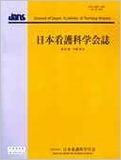Japanese
English
- 販売していません
- Abstract 文献概要
- 参考文献 Reference
- サイト内被引用 Cited by
要旨
目的:特発性間質性肺炎患者が認知する病気の不確かさの特徴及び関連要因を明らかにする.
方法:40歳以上で安定期にある特発性間質性肺炎の外来患者を対象に,病気の不確かさを「療養の場を問わず使用できる病気の不確かさ尺度;UUIS」(26項目6下位尺度,得点範囲26〜130点,得点が高いほど不確かさの認知が高い.)により調査した.また,特発性肺線維症群とそれ以外の群とを比較し,修正MRC,FVCを独立変数とした重回帰分析を行った.
結果:51例を登録し,特発性肺線維症は13例であった.年齢71.3±8.7歳,男性40名(78%)で,UUIS総得点の平均値84.7±20.0であった.多変量解析では,修正MRCが【闘病力への自信の揺らぎ】への不確かさに関連していた.
結論:特発性間質性肺炎患者が認知する不確かさは,呼吸困難感が【闘病力への自信の揺らぎ】の不確かさに関連しており,症状緩和に加えて心身両面への援助が必要である.
Aims: This study aimed to clarify the characteristics and identify factors related to uncertainty in illness as perceived by idiopathic interstitial pneumonia patients to help them cope with their illness.
Methods: The subjects included outpatients aged ≥ 40 years diagnosed with idiopathic interstitial pneumonia more than six months ago. Uncertainty in illness was assessed using the “Universal Uncertainty in Illness Scale; UUIS” consisting of 26 items and six subscales (a high score represents a high level of recognition of uncertainty). In addition, the uncertainty in illness was compared between the idiopathic pulmonary fibrosis group and the idiopathic interstitial pneumonia group excluding idiopathic pulmonary fibrosis. We conducted the forced entry multiple regression analysis using by the modified medical research council dyspnea scale, forced vital capacities.
Results: 51 patients included, age 71.3±8.7, males 40 (78%). Patients with Idiopathic pulmonary fibrosis were 13. The mean UUIS scale total score was 84.7±20.0. The uncertainty in illness of idiopathic interstitial pneumonia patients was assessed using their modified medical research council dyspnea scores which showed a positive correlation (P < 0.05), and their forced vital capacities which showed a negative correlation (P < 0.05). Multivariate analysis showed that the modified medical research council dyspnea score was an independent variable related to uncertainty in illness of [Instability of Self-confidence in Carrying on a Struggle against Illness].
Conclusion: Dyspnea tended to increase the perceived uncertainty in illness in the patients, suggesting its possible effects on the self-care of patients. Healthcare providers must consider care that takes into account the relief of symptoms, physical and psychosocial distress.
Copyright © 2017, Japan Academy of Nursing Science. All rights reserved.


